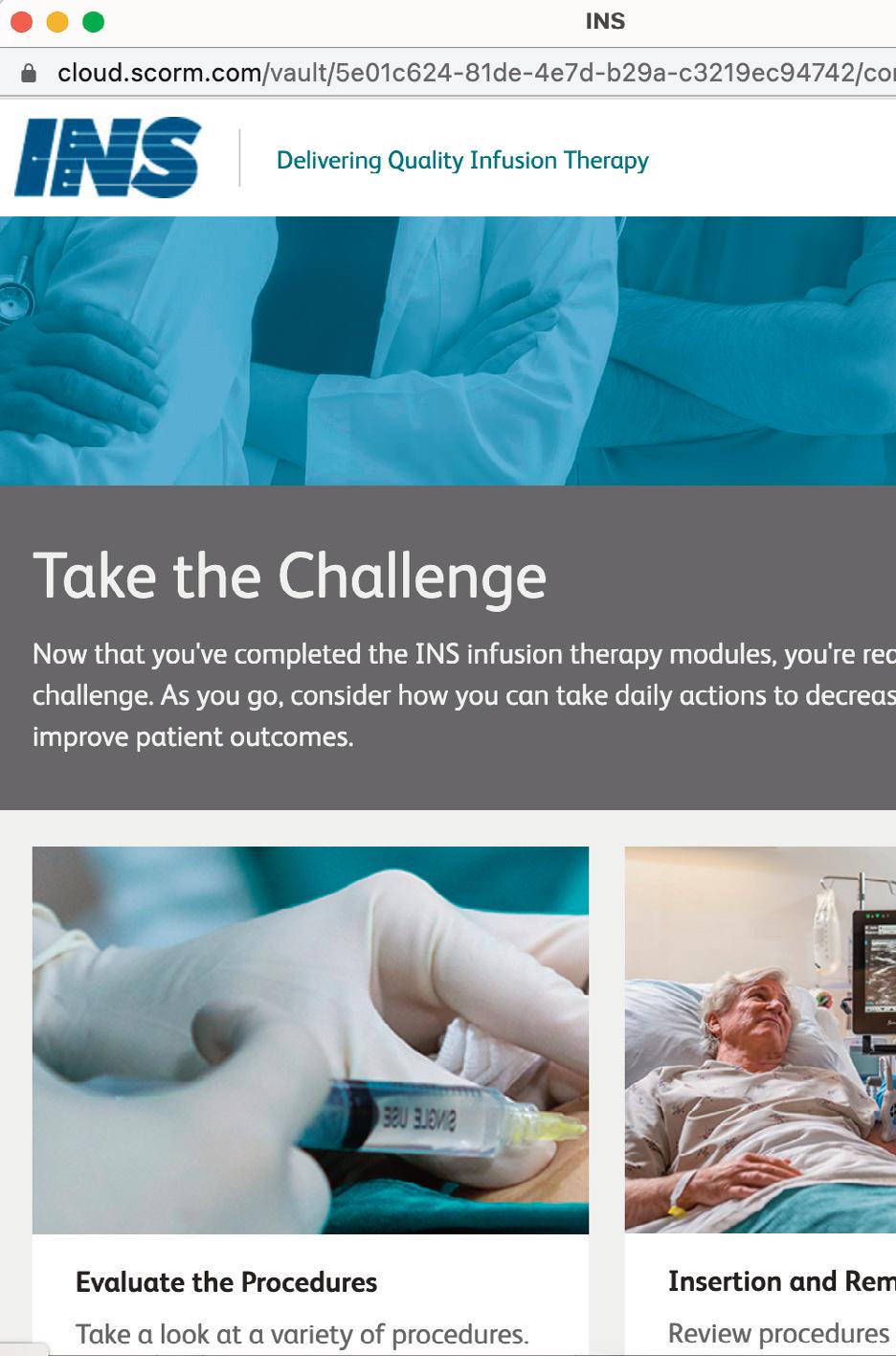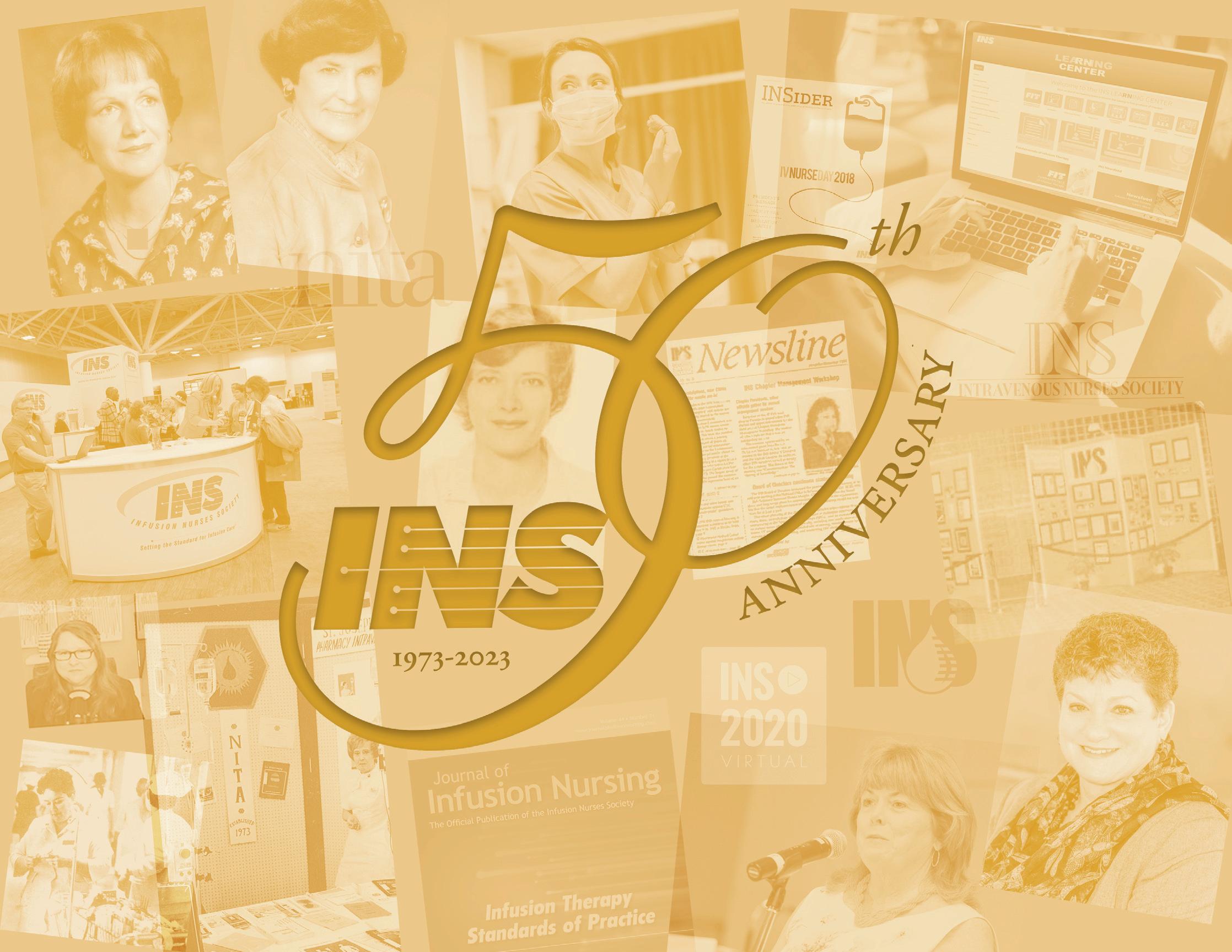


JANUARY/FEBRUARY 2021 INSIDER THE OFFICIAL MEMBERSHIP NEWS PUBLICATION OF INFUSION NURSES SOCIETY MAY/JUNE 2023 VOLUME 6 • ISSUE 3 INFUSION NURSES SOCIETY the New CEO Reflect on INS 2023 Celebrate Nurses Month! Meet the DEI Scholarship Winner anniversary th 1973-2023
INS BOARD OF DIRECTORS 2023-2024
PRESIDENT
Inez Nichols, DNP, FNP-BC, CRNI®, VA-BC
PRESIDENT ELECT
Danielle Jenkins, MBA, BSN, RN, CRNI®
PRESIDENTIAL ADVISOR
Sue Weaver, PhD, RN, CRNI®, NEA-BC
SECRETARY/TREASURER
Joan Couden, BSN, RN, CRNI®
DIRECTORS-AT LARGE
Jannifer Stovall, MBA, BSN, RN, CRNI®, IgCN
Pamela McIntyre, MSN, RN, CRNI®, IgCN, OCN®
PUBLIC MEMBER
Lisa M. Ong, CPA, PCC
CHIEF EXECUTIVE OFFICER
Chris Hunt, MBA
FUSION NURSES SOCIETY
INS STAFF
Director of Operations and Member Services: Maria Connors, CAE
Director of Publications and Educational Design: Dawn Berndt, DNP, RN, CRNI®
Marketing Manager: Whitney Wilkins Hall
Editorial Production Coordinator: Rachel King
Associate Managing Editor: Donna Knauss
Director of Clinical Education: Marlene Steinheiser, PhD, RN, CRNI®
Education and Member Services Project Manager: Jill Cavanaugh
Meetings Manager: Meghan Trupiano, CMP
Certification Administrator: Darlene Leuschke
Member Services Associate: Susan Richberg
Bookkeeper: Cheryl Sylvia
INSider encourages the submission of articles, press releases, and other materials for editorial consideration, which are subject to editing and/or condensation. Such submissions do not guarantee publication. If you are interested in contributing to INSider, please contact the INS Publications Department. Photos become the property of INSider; return requests must be in writing. INSider is an official bimonthly publication of the Infusion Nurses Society.
©2023 Infusion Nurses Society, Inc. All rights reserved.
For information contact: INS Publications Department One Edgewater Drive, Suite 209 Norwood, MA 02062
(781)702-5908
rachel.king@ins1.org
INS
IDER
THE OFFICIAL MEMBERSHIP NEWS PUBLICAT ION OF INFUSION NURSES SOCIET Y
INFUSION NURSES SOCIETY
3
In this Issue
Getting to Know the New CEO
Chris Hunt, MBA

5 9 11 15 27 28 29 31 33
National Nurses Month
American Nurses Association
CRNI® Connection: It’s Worth It
The Impact of a CRNI® Credential
Meet the Inaugural DEI Award Winner
Kimberly DuBore, BSN, RN
Thank You for Celebrating with Us!
INS 2023 Annual Meeting
2023 Call for NCOE Members
Marlene M. Steinheiser, PhD, RN, CRNI®
My Term on the National Council on Education
Susan Lown, DNP, RN, CNE
INS Learning Center
Webinars and Podcasts
Welcome New INS Members
Domestic and International
Membership Updates
New Professional Accomplishments
Getting to Know the New CEO
Most everyone in the INS/INCC community already knows Chris Hunt, the incoming CEO. He has been with INS since 1995 and has served as the meetings manager, the director of meetings, the director of marketing, and the executive vice president. We decided to ask him a few informal questions so the membership might get to know him even better.

What is your favorite restaurant and why?
Abe & Louie’s in Boston is my go-to restaurant for special occasions and celebrations with family and friends. The food is outstanding, and the atmosphere is exciting and energetic. There’s always a buzz that fills the restaurant and everyone has a smile on their face. The restaurant is always filled so it is not unusual to get a 9:30 p.m. reservation. Thank goodness for OpenTable!
What kind of books do you like to read?
Far and away, novels are my favorite. I am always amazed at how authors can make a story come to life. I am a huge fan of John Irving. I remember going to one of his readings while I was in college. It was right after he wrote his blockbuster novel, The World According to Garp. Fast forward to 2009 and I attended his reading for Last Night in Twisted River along with my son, who is also a big fan. It was at this reading where I learned that he always writes the end of his novels first, then goes back to write the beginning. Hands down, my favorite John Irving novel, in fact my favorite novel of all-time is A Prayer for Owen Meany.
What kind of music do you like to listen to?
Seventies music as well as alternative rock are high on my list, but my favorite recording artist is, and always will be, Boz Scaggs.
Where is your favorite place to vacation?
Italy! My wife and I have been there twice with our best friends and absolutely loved it each time. Venice, Sorrento, and Tuscany were the highlight cities for us.
What was your first job?
I began my working career at the age of 11 as a caddie! While lugging golf bags around a course for 4-5 hours (sometimes twice a day) wasn’t work for the faint of heart, it taught me to appreciate hard work, concentration, and discipline. It also afforded me the opportunity to earn the Francis Ouimet Caddie Scholarship that helped defray the cost of college years later.
5 INSider
CHRIS HUNT
How originally did you start working for INS?
What was it like at that time—how was it different than now?
One of the questions that people who work in the association/nonprofit space ask each other is “how did you end up here?” And the most common response is “by accident!” My response was no different. When I applied to INS, I did not know anything about associations. I had the requisite skills (sales and administration) for the position they were seeking to fill (meetings manager) but not the background in association management. One month and one Annual Meeting after I was hired, I was hooked! When I began working for INS we had one product, Standards of Practice, and two in-person meetings. There was no internet, email, website, or online learning. I would say it is quite a bit different today! However, the constant that did exist back then, and still exists today, is our commitment to change, flexibility, strategic planning/growth, and most importantly teamwork.
What are changes that have occurred on the business side of INS since you began?
From a business standpoint in the late 90s early 2000s, most of INS’s revenue was generated from our Annual Meeting and Industrial Exhibition and our National Academy of Infusion Therapy. Many members received financial support from their employer to become and remain members and to attend in person meetings. However, as employer support decreased and technology continued to increase, it was incumbent upon INS to develop new modes of education delivery and new revenue streams. The creation of the INS LEARNING CENTER did just that.
What motivates you every day?
The opportunity to have a better day than the day before motivates me both from a personal and work aspect. As I look back on my career at INS/INCC and see how far we have come as an organization, I am motivated to take it even further. In addition, having the opportunity to work with a tremendous staff who are committed to advancing INS/INCC’s missions motivates me. Business writer Patrick Lencioni has said, “Not finance. Not strategy. Not technology. It is teamwork that remains the ultimate competitive advantage, both because it is so powerful and so rare.” Without question, INS’s and INCC’s strength lies in its staff of committed professionals. It is what makes us tick, and I have been privileged to have a front row seat to watch all that they have accomplished.
What would you like the membership to know about the months ahead?
We are tremendously excited that the revision of Infusion Therapy Standards of Practice and all 5 versions of Policies and Procedures for Infusion Therapy will be completed and ready for publication in 2024. All members will receive a free copy of the print version of the Standards as well as free access to the digital version. In addition, members will receive a significant discount on the P&Ps. The publication of these resources is another example of INS’s commitment to education, our members, and the entire infusion community.
Is there anything else you’d like to share?
I am extremely appreciative of the opportunity to serve as the new CEO of INS and INCC. As INS celebrates its 50th anniversary in 2023, it is important to not only celebrate our successes and our position as the leading voice for infusion nursing, but also to look forward to ensure that we continue our path. This will require us to be forward thinking, engaged, solutions-based, connected, and value centric. It will also require us to reflect on what we do and how well we do it. Looking at short-term accomplishments and long-term change is critical to success and growth. It is also part of INS’s and INCC’s continuing self-assessment process and a major component of what will help us deliver meaningful results.
With the help and support of our truly engaged membership, we look forward to the start of the next 50 years of setting the standard for infusion care!
4 May/June 2023
Recognizing Nurses in May
The American Nurses Association is proud to lead the annual National Nurses Month. We are all indebted to nurses for their unwavering commitment to patients, their communities, and our health care system. The Nurses Month theme, “You Make A Difference,” was selected to encourage nurses, other health care professionals, employers, community leaders and the public to recognize and promote the vast contributions and positive impact of America’s nurses.
Celebrating honoring, and supporting nurses during the month of May provides an added opportunity to promote the value of nursing, advocate for the profession, conduct media outreach, and host events. Connect your activities to the official Nurses Month tagline — You Make a Difference — recognizing nurses’ unparalleled impact on health and health care.
MAY 1–7
Nursing is a rewarding and challenging profession so it’s critical you have access to authentic support systems and tools. Prioritize your self-care by engaging in healthy activities that target both your body and mind.

Consider joining Healthy Nurse, Healthy Nation™, a program designed to help you improve your health in six areas: physical activity, nutrition, rest, quality of life, safety, and mental health. Take the HealthyNurse Survey assessment to see where you are, access inspiring blogs, and join monthly 10-day challenges focused on supporting micro-behavior change towards your goals. Follow this link to learn more.
Do a self-care assessment. What activities are you doing to benefit your health and reduce your stress? Plan a course of action by using the free apps and resources offered through the American Nurses Foundation’s Well-Being Initiative. Take time for you and listen to ANA’s 9-part Gratitude podcast mini-series to learn how to cultivate a gratitude practice into your daily life.
“We must see and celebrate our nurses as whole humans, not as a fictitious image of an all-powerful, all-resilient hero.” Trusted Health offers resources for emotional and mental health support for nurses, emphasizing the need for the topic of mental health to be present in the health care conversation.
5 INSider
COVER STORY
MAY 8–14
Raise visibility of the critical work nurses do and foster greater understanding of the diversity of the nursing profession by honoring exemplary nurses and engaging with your community.

Request a proclamation from your mayor/governor declaring May 6 as National RN Recognition Day and/or declaring May as Nurses Month. (A sample proclamation is available in this toolkit.)
Host a video news conference or informal virtual media roundtable and discuss nurses’ response to major events and other important health care issues in your community. (Tips for Working with the Media are available in this toolkit.)
Honor a registered nurse for a heroic act or bestow an honorary nurse title on a deserving elected official or civic leader.
6 May/June 2023
MAY 15–21
As the largest group of health care professionals in the U.S., nurses provide care across all areas of the health care system and care settings. Focus on how you can excel in your nursing career and/or help other nurses in their professional journey.
Commit to participating in at least two free professional webinars. Look for topics that will expand your skills like communication, teamwork, and problem solving. Sign up for one of ANA’s free webinars from the Navigate Nursing series.

Consider certification to advance your career. Certification provides a number of benefits such as increased confidence, greater marketability, and more leadership opportunities. The ANCC Certification Program enables nurses to demonstrate their specialty expertise and validate their knowledge to employers and patients.
ANA’s Mentorship Resources facilitate one-to-one mentoring relationships that connect mentees with nurses who have more professional experience. This unique online networking and career development opportunity is free and open only to ANA members. Our mentoring resources reflect the American Nurses Association’s commitment to your professional development. To learn more about mentoring resources visit www.mentorship.nursingworld.org
If you’re an RN, consider registering for your National Provider Identifier (NPI). You provide quality care to your patients day in and day out, and this will help to evolve reimbursement to reflect the true value of nursing.
7 INSider
MAY 22–31
Help promote nurses’ invaluable contributions by engaging with your community and educating them on what nurses do. The vital role of nurses as leaders in their organizations, on boards of directors and as elected officials at the local, state and federal levels is making a difference in improving the nation’s health.
Pay tribute to a local nurse, or recognize all nurses who provide care every day, yearround. Write a letter or share a video from nurses. Share the tribute or a special thank you on social media using the hashtag #ANANursesMonth and #YouMakeADifference
Partner with other nursing and health care organizations in your area to sponsor a joint Nurses Month event. Consider a (virtual) fundraiser for the community, a blood drive, or online workshops aimed at reducing stress and building morale. (Use the resources listed in this toolkit to help get you started.)

Discuss current and ongoing health care issues with elected officials at the local, state, or federal level. Elected officials should be visible and accountable for their positions on health care. Stay up to date with ANA’s Policy & State Government Affairs program which monitors trends in nursing-related legislation in the states.
Take the opportunity to educate state legislators about the role and value of registered nurses in the health care system. Visit RN Action’s advocacy toolkit to learn how to voice your concerns about the nursing profession to Congress and stay up to date on the latest news and legislation from the Hill.
8 May/June 2023
It’s Worth It: The Impact of CRNI ® Certification on Patients, Nurses, and Health Care Organizations/Systems


9 INSider
2021 marked the 20th consecutive year that nursing was rated the most trusted profession according to a Gallup poll (Gaines, 2022). This comes as no surprise to the millions of nurses who consistently go above and beyond what is expected, or to the millions of patients that they treat. Yet, for the legions of nurses who specialize in an area of nursing and hold a certification, these accolades only begin to describe their commitment.
Specialty nursing certification, as defined by the American Board of Nursing Specialties (ABNS), is “the formal recognition of the specialized knowledge, skills, and experience demonstrated by the achievement of standards ed by a nursing specialty to promote optimal health outcomes” (American Board of Nursing Specialties, nition is a formal, yet extremely accurate way of describing a certified nurse as knowledgeable, experienced, dedicated, impactful, and above all caring. And nowhere are these traits more evident than with nurses who hold the CRNI® credential.
Infusion therapy has little, if any, margin for error. It impacts not only patients and nurses, but the entire health care system. Despite this, the question that is often asked centers around value. Specifically, “Is infusion nursing cation worth it?”
If you are contemplating sitting for the CRNI® exam and are questioning the importance and need for an infusion nursing certification, you may want to consider the impact on the patient receiving an PIVC. Is it worth having ed infusion nurse who has passed a rigorous exam that covers every area of the infusion specialty? Is it worth having a certified infusion nurse insert the PIVC on the first try without complications?
Is it worth having a certified infusion nurse who selects the right catheter, based upon the patient’s vasculature and the IV medication/solution being prescribed? Is it worth having a certified infusion nurse who can instill a sense of calm in a nervous patient?
Have you talked to colleagues that have taken the CRNI® exam and asked if they feel that the time and effort they put into studying for the CRNI® exam was worth it? If so, we think you heard what we often hear, which is how much these nurses learned just by studying for the exam. In many cases It expanded their knowledge base and helped boost their dence. The bonus for them was passing the exam and adding the CRNI® credential to their title. They have told us that the impact of the CRNI® credential on their career is immeasurable.
The impact of the CRNI® credential does not stop with patients and nurses. It carries over to the health care organizations that hire and employ nurses. These organizations recognize the importance that certified nurses bring to their facility. According to a survey from the American Hospital Association Certification Center, 86% of health care facilities say that certification is a contributing factor in hiring (Vaughn, 2020). From an infusion aspect, CRNI®s perform at a higher standard and help improve the financial bottom line. These are key factors in an organizations’ hiring decision.
Are you still evaluating the value of the CRNI® exam?

Here’s a spoiler alert. It’s worth it!
References
About us. American Board of Nursing Specialties. November 22, 2022. https://www.nursingcertification.org/About-ABNS
Gaines, K. Nursing ranked as the most trusted profession for 21st year in a row. nurse.org. January 19, 2022. https://nurse.org/articles/nursing-ranked-most-honest-profession/ Vaughn, N. The importance of nurse certifications. Relias. November 6, 2020. https://www.relias.com/blog/the-importance-of-nurse-certifications.

10 May/June 2023
Meet the Inaugural DEI Scholarship Winner
Kimberly DuBore, BSN, RN, began her nursing career in her late twenties, and is currently the PICC/imaging and procedural nurse at Harbor Regional Health, a rural community hospital. She has served as a clinical nurse educator of vascular access devices/procedures for a medical supply company for the past 13 years as well and is an on-call vascular access specialist for inner city hospitals in the Washington Puget Sound area. She is also the cofounder and nurse-injector for an aesthetics business. She started nursing a bit later in life because she was in the US Navy loading torpedoes and missiles on submarines, serving on the USS Canopus AS-34 in the Atlantic Fleet.
Her clinical background includes medical/surgical, operating room, and multispecialty. She identified and created the first and currently the only nursing position in her radiology department, moving the vascular access line—PICCs, midlines, and phlebotomy as well port accessing and catheter evaluations (dye studies)—from the operating room. In the event a chest X-ray is obtained, she has been credentialed by the chief of radiology to verify tip placement.

She is motivated by patients telling her “Wow! No one can ever get a vein on me, and you did it!” She wants to be patients’ superhero, and loves that patients ask for her by name, and if they don’t remember her name, ask for “the gal with the special machine.” She tells them that’s her superpower.
Please describe your hospital and the location of your hospital both in general and in relation to the Quinault Indian Nation.

Harbor Regional Health, formally known at Grays Harbor Community Hospital, serves residents in the southwestern region of Washington State, near the Pacific Ocean. The hospital is a publicly owned rural facility that helps support the county, including the Quinault Indian Nation. The reservation is located in Taholah, just shy of an hour from the hospital, in an even more rural area along the ocean coast.
Please describe your community population.
Our community is known as the “Gateway to the Olympic Peninsula.” The region has a rich history of being an old logging community. Logging, fishing, wildlife observation, and other outdoor activities are abundant. The Quinault Indian Nation is a sovereign nation that descends from other coastal tribes. The Quinault population is 10 percent of the population of the county, and their culture and contributions feel present: they are a major element of the community, working hard at maintaining their developed businesses, such as Quinault Pride (seafood distributing), Quinault Beach Resort and Casino, a health and social services department, a natural resources department, a maritime resort, and a mercantile. Only about a third of the Native Americans live on the reservation; the other two-thirds live throughout the county.


11 INSider
Describe what you do on a daily basis.
I currently work as the solo radiology nurse, a position I developed myself. Working in the operating room, I was one of only 2 PICC clinicians of the facility. At the time of X-ray verification, I found myself in radiology frequently, discussing tip confirmation. The chief of radiology would then request that I access ports and assess patients with contrast extravasations. As a result of my frequent presence, I built a case to show they needed a nurse. I could move my PICC service to radiology and place longer catheters in DIVA (difficult IV access) patients to assist with fewer extravasations and access their ports. The added bonus was that I was a procedural nurse that could pull procedures from the operating room and move them into an outpatient setting and decrease the cost to the patient by not needing an operating room suite. I then led a process improvement project to help identify DIVA patients so that they didn’t have to be “poked” multiple times, ultimately resulting in failed attempts. They would come in 15 minutes prior to their CT or MRI, and I would place a catheter under ultrasound guidance, usually on the first attempt. This increased patient satisfaction, vein preservation, and patient throughput.
What kind of facility is on the Quinault Indian Nation?
Roger Saux Clinic is a primary and urgent care facility located on the reservation. Resources and staff are limited in this rural area, and they tend to frequently refer to other facilities all over that state, as needed. The Quinaults have a diabetes and nutrition program, and also contract with an optometrist that comes weekly from outside the reservation area. Currently, they are seeking out other types of treatment, such as massage and acupuncture. Their team includes but is not limited to a dietician, a nutritionist, pharmacists, pharmacy techs, RNs, LPNs, an ARNP, an MD, and MAs, led by a health and wellness director who is a tribal member.
How do Quinault Indian Nation member care for one another, culturally? What is their cultural support system?

The Quinaults are family-oriented, and beyond the family comes the community of the tribe. When end-of-life situations arise, it involves the tribe, whether immediate family or not. The goal is to surround the family member at home, and meals, transportation, or any other support is provided by extended family or tribal members. Prior to COVID, the local hospital was able to accommodate many of the tribal members who desired to surround the family at their time of need. Like elsewhere, COVID created obstacles: out-sourced services and “big city” appointments became virtual, and younger, tech-savvy or formally educated members helped the population navigate this new reality. On the other end of the spectrum of life, when a child is born, the first sound the newborn hears is the mother or father of the child sing in their native tongue. Like with non-natives, there are many religious practices that vary. As COVID restrictions loosen, Harbor Regional Health is attempting to be more culturally sensitive to tribe members’ needs.
How does your facility supplement the tribe’s facility? What additional support do you offer?
Harbor Regional Health offers many specialties that the Roger Saux Clinic does not. We get referrals from Roger Saux Clinic to assist in keeping the patient and their family members as local as possible. I have come to know many of these tribal members and their families, and therefore I offer to speak with them on the phone or to answer questions or offer referral support. I make it clear that I may not have the answers, but I know where to seek out the support.
12 May/June 2023
How is your staff culturally literate and sensitive? Do you have Quinault members on staff/or do you consult with them?


We currently do not have Quinault members on our staff; however, we have had a Queets tribal member, Samantha Capoemen, RN, work for one of our medical offices after graduating from her RN program, and she has been an integral resource for hospital staff who need to discuss cultural issues. During her clinical rotations, she worked with multiple family practice providers within our system, and is currently dedicating herself to finishing her nurse practitioner clinicals and sitting for her boards by this summer. Her goal is to open a practice in Queets, a federally recognized tribe of the Quinault Indian Nation, where currently a small rural clinic is open only one day a week. She will take up residency in the area and plans on opening her clinic for at least 3 days a week.
Describe the care transition team. How do they facilitate admission? Please give examples.
Our care transition team works closely with the social service team at Roger Saux Clinic. However, the Quinaults don’t have a home health division so they work with our local home health agency to involve the family as much as possible. The providers at the clinic are able to consult via phone regarding patient conditions, and to confer if admission is warranted. Generally, the process is fed through the emergency department.
How specifically do you all encourage patients to be proactive with their health care?
I discuss the plan of care with multiple members of the family, including the results or potential consequences. Each person might understand different elements of the conversation. I also provide patients with my business card which includes my email and phone number. I let them know I am available for any questions or concerns. I am clear that I will not know all the answers, but I will know where to go to find the answers for them. I also let patients know “who at the clinic” I know so that they are aware of our networking, hoping that this will lessen the barriers of communication.
What kind of education and support follow-up do you provide? What are some examples?
I provide visual tools. For example, when I discuss ports versus PICCs, I physically show them the devices, allowing them to touch and demonstrating how they work. My product reps will provide these devices. I also have a phantom chest so that they can see the anatomy as well. I discuss catheter occlusion issue: I was provided with a 3D model of a catheter displaying various types of occlusions. This helps my patients understand why their port is not aspirating which is useful in performing catheter evaluations, or “dye studies.” I also have pamphlets, but I find that face-to-face conversation is best because then I’m able to read the facial expressions and body language to help me know whether what I am saying is being understood. For follow-up, I encourage them to “contact Samantha at the clinic, and together we can troubleshoot.”
13 INSider
What aspect(s) of your current position do you find meaningful? Why?
Every day is different. I am involved in many aspects of patient care and do well with multitasking. I created my position, and therefore I have attempted to pull all aspects of my career together: operating room, legal issues (compliance and policy), sedation, vascular access, and PICC service. My radiologists are very supportive and have given me quite a bit of autonomy to assist with patient care and education. I don’t have to spend only 10 minutes with a patient; I spend as much time with them and their families as needed. I speak with each patient prior to invasive procedures to educate and answer questions before scheduling. When my scheduler contacts the patients, she often hears, “I want that nurse that I talked to.” That is rewarding: they may not remember my name, but they remember how I made them feel.
Do you have any other specific patient stories or examples you would like to share?
My active involvement started like this: one of the most respected elders of the Quinault tribe, Pearl Capoeman, who gave me permission to share this story, had been going through some changes in her health that required more than routine blood draws and contrast enhanced CTs, and she had been identified as a DIVA. Her access was extremely limited to support large volume phlebotomy and power injection diagnostic studies—so limited that even with oral hydration I was unable to gain suitable access.
After multiple failed attempts, I had discussed with her the option of a port placement. With her permission, I contacted her primary care provider. The provider was aware of my skill set, and when I told her that I was unable to provide the patient with her needs and recommended a port placement, the primary care provider gave a referral immediately and Pearl received an implanted port.
I assumed that the surgeon had given her instruction as to where to follow up for port care, but I was wrong. Samantha Capoemen, the RN from the Roger Saux clinic, called me indicating that Pearl was referred back to her clinic and that she had no experience with port care and maintenance. Because of the distance, Samantha did not want to send Pearl “to town” for each frequent blood draw, so I gathered some supplies, literature, visual aids, and my institutions’ policies and drove out to the clinic in Taholah.
There were 3 providers there, and two nurses to whom I demonstrated access, flush/lock, and de-access, along with return demonstrations. I lent them some supplies until they could get theirs ordered as well as connected them with contact information and order numbers for items they needed. By providing my policies, I allowed them to morph those into their own, while still following the INS Standards
Recently, the clinic purchased an ultrasound machine for multiple uses. Samantha mentioned that they are trying to teach themselves to use it for USPIV placements. I told her that if she can gather the providers and the other nurse (there are only 2 in the clinic), I will volunteer to come and teach them.

Congratulations Kimberly!
In the coming months, please keep an eye out for the application for the 2024 DEI Scholarship.
14 May/June 2023















15 INSider TH 1973-2023 ANN I V E R YRAS anniversary th 1973-2023 Thank you for Celebrating 50 Years With Us!








16 May/June 2023

















17

















18














19



















20











21











22












23



























NOW ON-DEMAND INS 2023 ANNIVERSARY 50 th PURCHASE TODAY AND WATCH FROM THE COMFORT OF YOUR HOME OR OFFICE INS 2023 VIRTUAL PROGRAM REGISTER TODAY 26 May/June 2023
Are you interested in promoting the mission of INS by providing professional development opportunities and quality education? Read more about the INS National Council on Education (NCOE) to decide whether being a member of this council is your next career goal.
What Are the Responsibilities of NCOE?
The NCOE works with the INS Education Department to develop programs which address the latest methodology, current trends, most prevalent issues, and subjects of general interest to infusion nurses.
Council members:
• Attend quarterly virtual meetings, including an annual conference planning meeting
• Review submissions from the call for abstracts
• Plan and contribute to the development of educational topics, learning objectives, and content outline for presentations
• Collaborate with speakers to foster high quality and engaging educational content
• Implement and evaluate educational sessions
Who Are the NCOE Members?
NCOE members are active members of INS with a minimum of two years of clinical experience in infusion nursing and experience in the development of educational programs. Council selection is based on, but not limited to, practice environment, educational program expertise, and clinical and educational credentials. NCOE is comprised of content experts in the field of infusion nursing; council members are active practitioners in the specialty area and are well versed in the clinical aspect of the profession.
Members of NCOE, the INS Director of Clinical Education, the INS Clinical Education and Publications Manager, and the INS Conference Education Coordinator are all part of the INS Education Team. Because the INS Education Team believes that educational content must continually evolve to reflect changes in the science of professional nursing, the Team works diligently to ensure that the latest evidence-based education is available to INS members and to the infusion community.
Education Team Goals
1. To provide educational programs that will improve the delivery of health care and the practice of infusion nursing.
2. To disseminate knowledge by providing educational opportunities for infusion nurse specialists and members of allied health care specialties and professions to exchange information and clinical practice expertise and to explore collaborative practice.
3. To promote high quality professional practice through education.
If you are interested in being considered for a position as a NCOE member, please apply by May 12, 2023
Selected applicants will be appointed by June 9, 2023.
If you have questions about the position, please email Marlene M. Steinheiser, PhD, RN, CRNI®, Director of Clinical Education at marlene.steinheiser@ins1.org.
We are grateful to our NCOE members for their dedication to the infusion nursing profession.
NC OE N A T I O N A L C O U N C I L O N E D U C A T I O N 27 INSider Volunteer Committee Opportunity: 2023 Call for NCOE Applicants
My Term on the National Council on Education
by Susan Lown, DNP, RN, CNE
As a dedicated lifelong learner, the opportunity to serve on INS’s National Council on Education (NCOE) presented itself as meaningful way to both apply and expand my existing clinical expertise. My blended professional roles as nursing professor, home infusion nurse, and member of a hospital vascular access team continuously challenge me to remain abreast of best practices in both education and infusion nursing. Upon learning of an opening on the NCOE, I speculated that serving as a member of the Infusion Nurses Society’s education team would become one of my favorite forms of scholarship. Now at the end of my term, I can confidently say that my conjecture was confirmed.
The NCOE members are a group of dedicated INS infusion nurses who value and promote ongoing education in the specialty practice of infusion therapy. NCOE members serve a three-year term, which allows sufficient time for learning the role, with new members working closely with a mentor during the first year, then further developing the role over the next two years of service. Working collaboratively under the leadership of INS’s director of clinical education, NCOE members participate in the planning and delivery of the educational components of the annual INS meeting. Once responses from INS’s call for abstracts have been collected, the NCOE meets to evaluate which topics will best fill existing practice gaps and meet the educational needs of the diverse INS membership. NCOE members then interview prospective presenters and further consider the topic and its suitability for the annual meeting. Once selected presenters have been invited to present their topic at the meeting, NCOE members work one on one with the presenters to build and refine their presentation. NCOE members are then sponsored by INS to attend and facilitate the annual meeting on a rotating basis in order to ensure, alongside other INS staff members, that the meeting runs smoothly.

In 2021, I traveled to Las Vegas for INS 2021, and this year, I worked the INS 2023 meeting in Boston. The opportunity to witness the outcome of months of labor has been tremendously rewarding for me. At the meetings, NCOE members are assigned sessions to moderate and also meet intermittently throughout the meeting to discuss details as needed. While members remain busy moderating sessions throughout the day, there is also ample time to meet with vendors and explore the meeting hotel and city highlights in the evening. And at least once during the span of the meeting, the director of clinical education reserves a table at one of the hotels’ well-known restaurants and gathers all the NCOE members together for either a lunch or dinner, providing an opportunity to informally mingle and socialize. Once the meeting has ended, the NCOE members meet to debrief, making note of successes and opportunities for improvement for the next meeting, as it is then time to begin planning for the next annual meeting once again.
As a native New Yorker, now residing in Indiana, I was excited to work with an infection prevention expert from Manhattan at INS 2022. This clinician was presenting on how their team approached central line-associated bloodstream infection (CLABSI) prevention strategies during the COVID-19 surge. Because I had lived and worked in Manhattan during my early years of practice, the collaborative relationship I developed with the presenter was special: we met virtually several times to strengthen the presentation, which also strengthened our relationship. As a colleague and coach, it is natural for NCOE members to develop a mutual bond with our presenters, as we become just as vested in their success as they are.
Returning home following four days of intensive collaborative learning at an annual meeting is a grand opportunity to share what you have learned with colleagues, and in my case, my nursing students. This in turn seemed to spark the home team to pursue ideas and consider ways to implement practice changes that promote optimal patient outcomes. So, as you can see, the process is ongoing and cyclical, generating a keen sense of ownership and accomplishment in one’s role in infusion nursing.
In addition to an NCOE member’s role in the annual meeting, they may encounter scholarly opportunities during their term of service. For example, in 2021, prior to the publication of the 8th edition of the Infusion Therapy Standards of Practice, INS invited NCOE members to serve on a panel of individuals across health care specialties from 17 countries around the world as peer reviewers. The honor of serving on this panel was notably a significant milestone in my infusion nursing career.
My three-year term of service will come to an end once any outstanding details of INS 2023 have been resolved. The culture of the NCOE has been extremely collegial and collaborative, and INS has supported and respected myself and other members as contributors to the development and execution of the annual meeting. I am only one person, making small differences one at a time, but as an NCOE member I have been an integral part of something larger than myself.
28 May/June 2023
Susan Lown, DNP, RN, CNE
View these webinars and more on-demand: www.learningcenter.ins1.org/webinars

The Positive Impacts of Rapid Infusions
You Can Write! Anatomy of Writing for Publication
Listen to these podcasts and more on-demand: www.learningcenter.ins1.org/podcasts

Chat with Matt: The Importance of Hemodilution in Infusion Therapy

Plasma-Derived Medications: Donors Make Them Possible
The Role of the Infusion Nurse in Monoclonal Antibody Administration
Safe IV Push Medication Administration Practice

29 INSider



Welcome New Members!
DOMESTIC MEMBERS
Dee Alhadi
Morgan Alpha
Cari Altmann
Alexis John Amponin
Meris Armenia
Nichole Arthur
Mandee Babino
Ruth Bailey
Aliya Baker
Delinda Bane Melvin
Katie Barber
Amanda Benfield
Tara Benson
Amy Benton
Matthew Bernhagen
Rick Biro
Jennifer Bluntzer
Chant Bogucki
Christina Boss
Mark Bovard
Megan Brady
Gwen Broderick
Jessica Campuzano
Diane Carey
Amy Carroll
Christopher Carson
Lynn Carten
Melisa Castillo
Ramona Cesareo
Acacia Cespedes
Jennifer Christianson
Mary Ellen Cockerham
Evie Collins
Marla Conley
Kim Couture
Gina Croft
Shareen Cronin
Rosalia Crosby
Stephanie Cunningham
Brandi Dach
Monica Dalton
Olivia D’Angelo
Gina Deitz
Malorie DeStefano
Karen DeVries
Erica Dickey
Melonie Driese
April Dumond
Charla Dunn
Debora Ellsworth
Simon Evangelista
Lola Faulkner
Carrie Fertig
Natasha Festa
Anna Ficken
Elizabeth Fleszewski
Marissa Fleury
Marie Folles
Stacy Garcia
Lisa Gerstenslager
Jaclyn Gnoza
Stephanie Gober
Caitlin Greve
Kristie Griggs
Dianna Grzebyk-Knowles
Penni Guidry
Teresa Guy
Jeremy Hague
Susan Hamby
Steven Harasti
Darryl Harper
Lanita Hawkins-Fisher
Charissa Haywood
Danielle Hebert
Ashley Henderson
Lisa Heral
Barbara Hicks
Joseph Higgins
Kirsten Hoffman
Kimberly Holt
Carolyn Hooper
Martha Houghteling
Madison Huffman
JayLene Johnson
Marianne Johnson
Stephen Jones
Kayla Jordan
Lauren Jurgelon
Katelyn Kachman
Trisha Katcher
Mariko Kays
Starr Kearney
Tracy Keller
Stefanie Kuhnhausen
Sean Lau
Deanna Leal
Kristen Lemorie
Carole Lewallen
Liliya Lezhnyak
Mark Wilson Lim
INSider 11
31
INFUSION NURSES SOCIETY
Christopher Malloy
Michelle Mari
Tara Mason
Lora McCartney
Heather McGovern
Gina McIntyre
Scott McKelvey
Monica McManus
Tamra McNeil
Angela Michalicek
Michelle Monay
Amy Monroe
William Moye
Kathleen Murphy
Julie Myxter
Taysha Napolitan
Andrea Nelson
Rongchai Nilmag
Michele Nomura
Michelle North
Margaret Nwankwo
Greg Okoniewski
Elizabeth Ossege
Teresa Palazzo
MIchael Parrish
Keli Patterson
Karine Pezeril
Venessa Pickering
Eliska Plackova
Julia Marcela Ponce
Moishe Ragieme
Kristen Rasmussen
Jennifer Reid
Jessica Rice
Emma Richards
Nancy Richmond
Hannah Riggs
Caitlyn Ritter
Lacie Riviere
Heather Robinson
Albert Rolon
Paulina Romero
Christopher Ross
Corey Rowland
Preston Salyer
Mackenzie Schneider
Jamie Schwartz
Kristina Schwenn
Anishka Sears
Stevie Sena
Jamie Sharp
Mandy Shew
Lisa Smith
Kevin Sniffin
Aimee Snyder
Patricia Spading
Roxanne Spengler
Rebecca Springer
Suzanna Stork
Jodi Striker
Sherri Stroud
Pamela Sullivan
Jenni Swart
Kelly Tavares
Cathy Taylor
Elizabeth Tekyi
Justin Theriot
Courtney Thomas
Kara Thornton Wong
Kevin Townsell
Chelsea Traughber
Crystal Tulloch
Kathryn Ubben
Margaret Van Dyke
Matt Varnum
Addie Vigil
Sarah Visic
Heather Walters
Jennifer Warren
Brandy Waters
Marjory Williams
Jodi Williamson
Amanda Yax
INTERNATIONAL MEMBERS
Jerusa Armani – Brazil
Ashley Chauvin – Canada
Bene Franquien – Canada
Carolyn Hebert – Canada
Shaul Horwitz – Israel
Carla Rocio Huerta Jimenez – Mexico
Matty McDonnell – Australia
Vannusso Menezes – Brazil
Belinda Mikaelian – Australia
Eliska Plackova – Saudi Arabia
Paola Riveri – Chile
Ana Valeska Siebra e Silva – Brazil
Mina Yun – South Korea
32 May/June 2023
Membership Updates
INS is pleased to recognize the following individuals for their recent accomplishments, awards, and promotions.
Do you have an accomplishment, award, and/or promotion you’d like to share?
If so, please email rachel.king@ins1.org.
Karin Cierzan, RN, CGRN, CRNI®, a staff RN in endoscopy and infusion therapy at MNGI Digestive Health, spoke at the INS 2023 Annual Meeting in Boston in April on infusion therapy in the GI setting.

Rodney GB Clements, BSN, RN, CRNI®, CEO, founded RN Enterprises Infusion Services, Inc., the fastest growing, most experienced team of infusion nurses in the country.
Nerissa Mackie, BSN, RN, CRNI®, was recently promoted to assistant nurse manager in a medical/surgical/oncology unit in the Bay Pines VA Healthcare System. She is in a master’s degree in health leadership program at Western Governors University with an expected graduation in June 2023. She is a current member of the National Society of Leadership and Success, and was a recent 2022 Bay Pines Nursing Excellence Secretary Award Winner.
Karen Nichols, BSN, RN, CRNI®, who works at OptionCare Health, was a Hope Award recipient.
Tiffany Putnam-Northrup, RN, VA-BC, who works on the vascular access team at the Wilson Medical Center, just obtained her VA-BC and was nominated for the Daisy Award.
Lisa Walker, RN, CRNI®, IgCN, the director of nursing at Thrivewell Infusion, has implemented INS Standards competency of all registered nurses and nurse practitioners, was awarded a scholarship to IGNS 2022, and successfully passed her IgCN specialty certifying exam.
Renae Wedlake, CRNI®, was awarded the United Way Philanthropist of the Year Award 2021 for founding All Heart Infusion, a nonprofit infusion nursing organization that wants all patients to be cared for equally regardless of ability to pay. As of December 2022, the nonprofit has provided $600,000 in free care to patients in the Pacific Northwest who are underinsured, have no insurance, or insurance does not cover the nursing care.
33 INSider
Your Premier Online Infusion Therapy Course


The self-paced program consists of 8 learning modules that simulates a real-world experience. Each module is consistent with INS’s Infusion TherapyStandardsof Practice.


Courses will address learner’s gaps and challenges nurses can face while on the job, including building confidence, engaging in critical thinking skills, and familiarization with on-the-job resources and tools.

34 May/June 2023
Retrospective Issue

































































































































































































